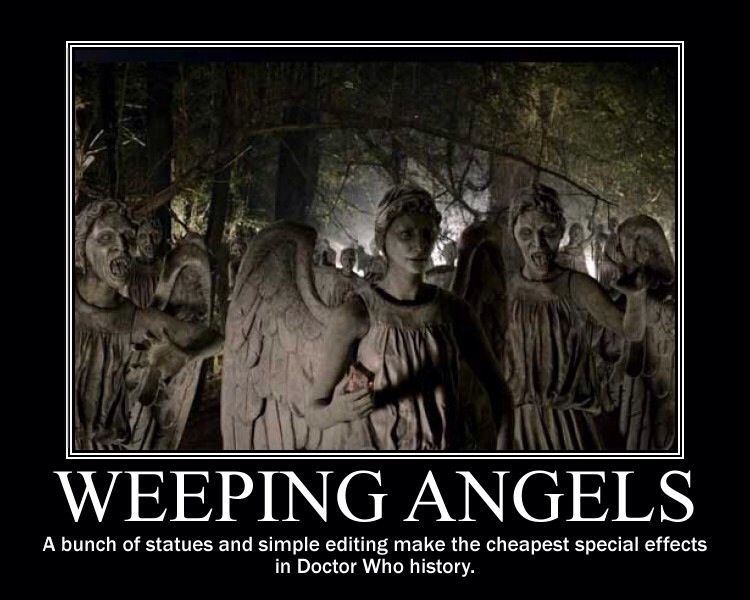(This is the third in a series. The previous posts are here and here.)

Introduction
In the better days of the post-revival of Doctor Who, one of the best additions to that series' mythology came with the invention of the Weeping Angels. Summarized, these hostile aliens cannot move if under direct observation, but if so much as a blink breaks that observation then they can--and do--move swiftly with superhuman potency against those they target.
This is Schrodinger's Box in its concept, an entity that is and is not simultaneously until directly observed. The experience of play in such an environment has tells, tells that point to this as the dysfunction, a dysfunction caused by deviating from--and solved by return to--the structure of play pioneered by Kriegspiel.
Only He Is Real, All Else Is Illusion
A campaign that dysfunctions in this manner has tells. The first is that the Referee will only have solid information on what is immediately about the party. The second is that One True Party is in effect, ensuring that they move and act as a unit no matter what. The third is that a form of Three Card Monty will be in effect to disguise that there is no contingency plans; all choices go to what is prepared.
On the players' side of the table, all of the "bad player" stories out there are not only a symptom of a lack of agency, but also a lack of investment; because the players have no capacity to shape how the setting changes over time (because time and space do not exist), they reject any claim of the setting being believable no matter how fantastic it is. Yet, because of One True Party, players are subject to these second and third-order dysfunctions on the regular and have for generations; the same complaints made now were made then. Same (lack of) inputs, same outputs.
Newer Is Not Better: Fixing The Problem
The problem of the campaign's setting lacking in substance is due to the aforementioned workflow problem. Making the players take up the roles of major actors and having them plot, scheme, and parley as they will shifts the burden of development from one central point to a decentralized network of nodes that interact with each other on a frequent and regular basis.
The Referee, freed from his undue burden, need only ask the player in question what is necessary about that actor's domain and then use that information at the table.
The Referee, by allowing players to participate in a manner other than being a single individual acting with a handful of others in a tactical scenario and keeping the players--if not those characters--briefed on what other players do, creates the illusion that the world exists separate, distinct, and apart from any group of characters at the table.
The Referee, by enforcing a strict accounting for and of time spent in the campaign and maping to the real world at a 1:1 ratio in days, guarantees that player actions always have meaning because they always have Opportunity Cost.
The Referee, by combining these three things, no longer needs to worry about everything that goes on; he need only know who is doing what, track those actions and adjudicate the results. This is as true at the table in ordinary tactical gameplay as it is away from the table engaging in strategic manuevering and grand-scale diplomacy. By allowing all of the players to (metaphorically) observe the setting at once, it remains in a fixed state and can only be changed by deliberate action from one or more players.
Many hands make light work, and many eyes make clear vision. By ensuring that time and space are fixed into place, done by insisting on proper workload balance and keeping the ledgers in order, the setting ceases to be and not be simultaneously; it is as real as the simulated war-torn lands are in the war colleges of today and yesteryear, if not moreso for being forever open to new campaigns (much like reality).
Conclusion
If yesterday's post was about the need for players to play the Patron and Domain game from the start, then this is about the need for strict accounting for time in order for actions great and small to have meaning and impact. That is also has the effect of getting many players to cultivate a rotating roster of characters to play at the table is a welcome bonus that adds to the verisimilitude of the campaign.
There is one more leg in the stool, as it were, that addresses one more big dysfunction- and that is for tomorrow.
No comments:
Post a Comment
Anonymous comments are banned. Pick a name, and "Unknown" (et. al.) doesn't count.